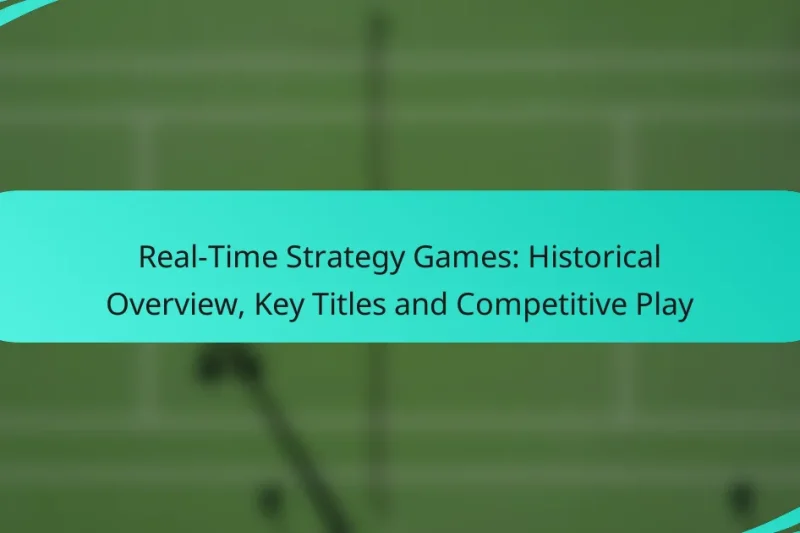Battle Royale games have surged in popularity, with titles like Fortnite, Apex Legends, and Call of … Battle Royale Games: Rise, Key Milestones and Competitive ImpactRead more
Esports History and Player Profiles: Esports Genres and Their Histories
Esports has transformed from informal competitions into a global phenomenon, encompassing a variety of genres such as first-person shooters, multiplayer online battle arenas, and battle royale games. Each genre not only showcases unique gameplay mechanics but also attracts diverse player communities, enriching the competitive gaming landscape. As technology and player preferences have evolved, so too has the structure of esports, leading to the establishment of professional leagues and a massive audience worldwide.
Fighting Games: Influence, Key Titles and Competitive Scene
Fighting games have profoundly influenced the gaming landscape by introducing innovative mechanics and creating vibrant competitive … Fighting Games: Influence, Key Titles and Competitive SceneRead more
Real-Time Strategy Games: Historical Overview, Key Titles and Competitive Play
Real-time strategy (RTS) games have evolved significantly over the years, blending engaging gameplay with strategic depth … Real-Time Strategy Games: Historical Overview, Key Titles and Competitive PlayRead more
Puzzle Games: Future Trends, Competitive Potential and Community Engagement
The future of puzzle games is being transformed by technological advancements and changing player preferences, with … Puzzle Games: Future Trends, Competitive Potential and Community EngagementRead more
MOBA Games: League of Legends, Dota 2 and Competitive Comparison
In the realm of multiplayer online battle arena (MOBA) games, League of Legends and Dota 2 … MOBA Games: League of Legends, Dota 2 and Competitive ComparisonRead more
Sports Simulation Games: Impact, Popularity and Competitive Growth
Sports simulation games have transformed the gaming landscape by offering immersive experiences that closely replicate real-life … Sports Simulation Games: Impact, Popularity and Competitive GrowthRead more
First-Person Shooters: Evolution, Key Titles and Competitive Impact
First-person shooters (FPS) have undergone remarkable evolution, transitioning from basic pixelated designs to sophisticated, immersive experiences … First-Person Shooters: Evolution, Key Titles and Competitive ImpactRead more
What are the most popular esports genres?
The most popular esports genres include first-person shooters, multiplayer online battle arenas, real-time strategy games, sports simulations, and battle royale games. Each genre has distinct gameplay mechanics and attracts different player bases, contributing to the diverse landscape of competitive gaming.
First-person shooters
First-person shooters (FPS) focus on gunplay and tactical gameplay from a first-person perspective. Popular titles like “Counter-Strike: Global Offensive” and “Call of Duty” emphasize teamwork, precision, and quick reflexes. Players often compete in teams, making communication and strategy essential for success.
In FPS esports, tournaments frequently feature formats like team deathmatch or objective-based modes. Players should practice aiming techniques and map knowledge to enhance their performance. Understanding the meta, or the most effective strategies and character choices, can also provide a competitive edge.
Multiplayer online battle arena
Multiplayer online battle arena (MOBA) games involve two teams competing to destroy the opposing team’s base while controlling various characters with unique abilities. Titles like “League of Legends” and “Dota 2” dominate this genre, requiring strategic planning and teamwork. Players must select heroes or champions that complement their team’s composition.
Success in MOBA esports hinges on understanding roles, such as support, carry, or tank, and mastering the game’s mechanics. Players should focus on map awareness and effective communication to coordinate attacks and defenses. Regular practice and studying professional gameplay can significantly improve skills.
Real-time strategy
Real-time strategy (RTS) games require players to build bases, gather resources, and control units in real-time. Titles like “StarCraft II” and “Age of Empires” are staples in this genre, emphasizing strategic planning and quick decision-making. Players must manage resources while simultaneously engaging in combat.
In RTS esports, understanding unit strengths and weaknesses is crucial. Players should develop efficient build orders and practice multitasking to enhance their gameplay. Watching replays and analyzing strategies from top players can provide valuable insights into effective tactics.
Sports simulation
Sports simulation games replicate real-world sports, allowing players to compete in a virtual environment. Popular titles include “FIFA” and “NBA 2K,” which focus on realistic gameplay and player statistics. These games attract fans of the respective sports and require knowledge of real-world tactics and player abilities.
In sports simulation esports, players should familiarize themselves with the game’s mechanics and the strengths of different teams. Practicing set plays and understanding in-game strategies can lead to better performance. Competing in online leagues or tournaments can also provide valuable experience.
Battle royale
Battle royale games pit players against each other in a last-person-standing format, with titles like “Fortnite” and “PUBG” leading the genre. Players start with minimal equipment and must scavenge for weapons and resources while avoiding a shrinking play area. This genre emphasizes survival, strategy, and adaptability.
Success in battle royale esports requires quick decision-making and effective positioning. Players should practice their shooting skills and learn to navigate the map efficiently. Participating in scrims, or practice matches, can help players develop teamwork and strategy in a competitive setting.
How have esports genres evolved over time?
Esports genres have evolved significantly from their inception, reflecting advancements in technology and player preferences. Initially focused on single-player competitions, the landscape has expanded to include diverse multiplayer formats, streaming capabilities, and various game types, shaping the current esports ecosystem.
Emergence of competitive gaming in the 1970s
The roots of competitive gaming can be traced back to the 1970s with arcade games like “Pong” and “Space Invaders.” These games introduced the concept of high scores, encouraging players to compete against one another for the top spot. Local tournaments began to emerge, laying the groundwork for future competitive gaming.
As technology progressed, home consoles like the Atari 2600 allowed players to compete in their living rooms, further popularizing the idea of competitive play. This era set the stage for the community-driven gaming culture that would flourish in the decades to come.
Growth of online multiplayer in the 1990s
The 1990s marked a significant turning point with the advent of the internet, enabling players to connect and compete globally. Games like “Doom” and “Quake” popularized online multiplayer formats, leading to the establishment of organized tournaments and leagues. This shift allowed for larger player bases and more competitive environments.
During this time, the concept of team-based gameplay emerged, with genres such as first-person shooters (FPS) and real-time strategy (RTS) gaining traction. The rise of LAN parties and early online gaming platforms fostered a sense of community and competition that would define the esports landscape.
Rise of streaming platforms in the 2000s
The 2000s saw the rise of streaming platforms like Twitch, which revolutionized how esports were consumed. Gamers could now broadcast their gameplay live, attracting audiences and creating a new form of entertainment. This accessibility helped popularize esports as a spectator sport, drawing in millions of viewers worldwide.
As streaming became more mainstream, sponsorships and advertising opportunities flourished, providing financial support for players and teams. This era also witnessed the establishment of major tournaments, such as the World Cyber Games and Electronic Sports World Cup, further legitimizing esports as a competitive industry.
What are the key milestones in esports history?
Key milestones in esports history include significant events and developments that have shaped the competitive gaming landscape. These milestones highlight the evolution of esports from informal competitions to a global industry with professional leagues and massive audiences.
First esports tournament in 1980
The first recognized esports tournament took place in 1980, featuring the game Space Invaders. This event, organized by Atari, attracted around 10,000 participants, showcasing the potential for competitive gaming. It marked the beginning of organized video game competitions, laying the groundwork for future tournaments.
As interest in competitive gaming grew, this early tournament demonstrated that players could compete for prizes and recognition. It set a precedent for future events, establishing a community around esports that would expand over the decades.
Launch of Major League Gaming in 2002
Major League Gaming (MLG) was launched in 2002, becoming one of the first professional esports organizations. MLG provided a structured platform for competitive gaming, hosting tournaments for popular titles like Halo and Call of Duty. This organization helped to legitimize esports and attract sponsorships, paving the way for future leagues.
MLG’s impact was significant in promoting esports on a larger scale, as it introduced live streaming and professional broadcasting, which helped to grow the audience and engage fans. The success of MLG demonstrated the viability of esports as a professional career path for players.
Introduction of League of Legends in 2009
League of Legends, released in 2009, quickly became a cornerstone of the esports industry. Its competitive gameplay and regular updates attracted a massive player base, leading to the establishment of professional leagues worldwide. The game’s popularity resulted in significant viewership numbers for tournaments, further solidifying esports as a mainstream entertainment option.
The League of Legends Championship Series (LCS) was launched in 2013, providing a structured competitive environment that featured top teams from North America and Europe. This league has since expanded globally, influencing the growth of esports and inspiring similar structures for other games.
Overwatch League launch in 2018
The Overwatch League (OWL) launched in 2018, marking a significant step in the evolution of esports leagues. OWL introduced a city-based franchise model, similar to traditional sports leagues, which attracted substantial investment and sponsorship. This approach helped to professionalize the industry and draw in a diverse audience.
With its unique format and high production quality, the Overwatch League has set new standards for esports events. It has also contributed to the growth of esports in regions like North America and Asia, showcasing the potential for competitive gaming to reach a global audience.
Who are the most influential esports players?
The most influential esports players have shaped the competitive gaming landscape through their exceptional skills, innovative strategies, and significant contributions to their respective games. These players not only excel in gameplay but also inspire millions of fans and aspiring gamers worldwide.
Lee “Faker” Sang-hyeok
Lee “Faker” Sang-hyeok is often regarded as the greatest League of Legends player of all time. His mastery of the game, particularly in mid-lane roles, has led to multiple World Championship titles, making him a household name in esports.
Faker’s impact extends beyond his gameplay; he has become a symbol of dedication and professionalism in the esports community. His ability to adapt to meta changes and consistently perform at the highest level sets a benchmark for aspiring players.
Johan “N0tail” Sundstein
Johan “N0tail” Sundstein is a legendary figure in the Dota 2 scene, known for his leadership and versatility as a support player. As the captain of OG, he led his team to victory in The International 2018 and 2019, making them the first team to win back-to-back championships.
N0tail’s strategic insights and team-building skills have influenced many players and teams in the Dota 2 ecosystem. His approach emphasizes teamwork and communication, which are crucial for success in competitive gaming.
Tyler “Ninja” Blevins
Tyler “Ninja” Blevins rose to fame as a prominent Fortnite streamer and player, becoming a cultural icon in the gaming world. His engaging personality and high-level gameplay have attracted millions of followers on platforms like Twitch and YouTube.
Ninja’s influence extends beyond just gaming; he has collaborated with various brands and participated in mainstream media, bridging the gap between esports and traditional entertainment. His success showcases the potential for gamers to build personal brands and careers in the esports industry.
What are the career paths in esports?
Career paths in esports encompass a variety of roles that cater to different skills and interests. From professional players to event organizers, each role contributes to the vibrant ecosystem of competitive gaming.
Professional player
Professional players are the athletes of the esports world, competing in tournaments for cash prizes and sponsorships. They typically specialize in specific games and must dedicate significant time to practice, often training several hours daily to hone their skills.
To succeed as a professional player, one should focus on mastering game mechanics, developing teamwork abilities, and maintaining physical and mental health. Many players start in amateur leagues before progressing to professional teams.
Coach and analyst
Coaches and analysts play crucial roles in guiding teams to success by developing strategies and improving player performance. Coaches focus on training and tactics, while analysts study gameplay data to identify strengths and weaknesses.
To become a coach or analyst, one should have a deep understanding of the game, strong communication skills, and the ability to analyze gameplay effectively. Many coaches have prior experience as players, which can enhance their credibility and effectiveness.
Content creator and streamer
Content creators and streamers produce engaging media related to esports, such as gameplay videos, tutorials, and commentary. They often build a following on platforms like Twitch or YouTube, monetizing their content through subscriptions, ads, and sponsorships.
Success in this field requires creativity, consistency, and a strong online presence. Aspiring content creators should focus on developing a unique style and engaging with their audience to grow their brand.
Event organizer
Event organizers are responsible for planning and executing esports tournaments, from local competitions to large-scale international events. They handle logistics, sponsorships, and marketing to ensure a successful event.
To thrive as an event organizer, one should possess strong project management skills, an understanding of the esports community, and the ability to negotiate with sponsors and venues. Networking within the industry can also provide valuable opportunities and resources.






